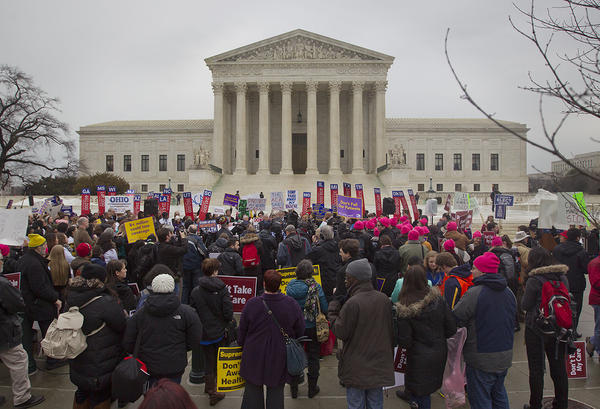Fate Of Obamacare Subsidies Now In SCOTUS’ Hands

Hundreds of thousands of middle- and low-income Georgians could lose the subsidies that help them pay for healthcare under the Affordable Care Act, their fate now hanging in the hands of the nine U.S. Supreme Court justices.
Attorneys presented oral arguments to the court Wednesday in King v. Burwell, the second challenge to the president’s hallmark legislation to make it to the Supreme Court.
At issue – and what the justices must now decide – is whether people who buy insurance through the federal exchange are eligible for subsidies to help pay for their plans. The opponents, four plaintiffs from Virginia, argue those subsidies are only available through individual state-run exchanges because of how the law is written. So far, only 13 states have set up their own exchanges, while three other states reverted to parts of the federal system after failed attempts to run their own.
The court’s decision has the potential to roll back subsidies for the more than 7 million people living in the other 34 states where insurance marketplaces are run by the federal government. Among them are nearly half a million Georgians who qualified for help paying for their plans, according to data from the Department of Health and Human Services. Only three other states have more enrollees who qualify for subsidies: Florida, Texas and North Carolina. As heard on the radio
Valerie Dalton of Stone Mountain is one of those who are at risk of losing her healthcare subsidies. At 64 years old, Dalton says she pays about $350 a month for her plan. Without federal help, she says that price tag would shoot to $700.
“I was afraid to go with anything cheaper because, although I’m in good health, you never know at my age what’s going to happen,” Dalton said.
Dalton, who retired from her bank job with a small pension a few months ago, says she couldn’t afford her plan without subsidies, even just for the few months until she qualifies for Medicare. She says she’d consider going without insurance for those few months.
“I know there’s a tax penalty for that, but what can I do?” she says. “I don’t know. I just don’t know.”
But critics of the law, including state Attorney General Sam Olens, argue President Obama has been acting in defiance of his own law.
In a brief filed with the Supreme Court in favor of the plaintiffs, Olens argues Congress “used a variety of ‘carrots’ and ‘sticks’” to convince states to establish their own exchanges. Among them, Olens argues, lawmakers intentionally excluded the subsidies from the federal exchange in order to pressure states to create their own.
What this means for state lawmakers, at this point, remains unclear.
Jen Talaber, a spokeswoman for Gov. Nathan Deal’s office, said in a statement that Deal is “aware of the impending Supreme Court ruling and its potential effects.”
“While he can’t speculate as to how the court will rule, Georgia law prohibits the creation and operation of a state-run exchange. Given that, the General Assembly would play a major role in any future decision.”
The Supreme Court is expected to rule in June.
9(MDAxODM0MDY4MDEyMTY4NDA3MzI3YjkzMw004))








